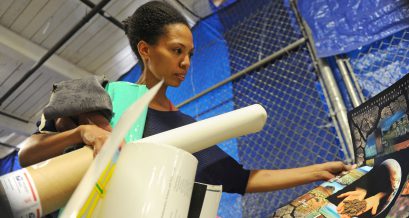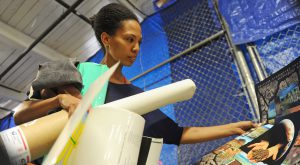What makes America the most inventive culture on the planet? When I go to international meetings, why do leaders from countries with the highest test scores tell me they wish their kids could be more like ours? It’s because we value free thinking, creativity and innovation. We raise our kids to discover their talents and pursue them toward futures full of possibilities.
-
Baltimore’s “super” approach to summer learning
Monday, June 18, 2012When the schoolhouse doors close on the last day of the school year, students are looking forward to a carefree summer. But they are at danger for summer learning loss and can lose critical knowledge and skills over the warm months. Low-income students are disproportionately affected and can lose months in reading skills, far more than their higher income peers
-
Knowing the full face of our history
Monday, May 14, 2012If you’re like me, you were taught that slavery ended with Emancipation Proclamation. Then Rosa Parks refused to give up her seat on the bus and the Civil Rights Movement began.
It wasn’t until adulthood when I realized that I had only a vague understanding of a large part of our history, and that what I was taught regarding slavery in this country was only a part of the story.
-
Students tackle Baltimore’s public transportation system
Monday, May 07, 2012The voices of young people can have the power to revive and transform Baltimore, starting with its very infrastructure. In Baltimore, transportation creates obstacles for its residents, and this is no less true for its young people. Late buses, skipped stops, and rude drivers are major barriers to students getting to school on time.
-
Michael Bloomberg Gives $5 Million to OSI-Baltimore
Friday, April 13, 2012During his visit to Baltimore yesterday, New York Mayor Michael Bloomberg announced a gift of $5 million to the Open Society Institute-Baltimore for its Accelerated Pathways Initiative. This five-year initiative will create rigorous, supportive and accelerated high school options in Baltimore that will significantly increase graduation rates and post-secondary success, particularly for the city’s African-American […]
-
A stain that never goes away
Monday, April 02, 2012According to the Just Kids Report, each year Maryland charges 1,250 youth as adults with little concern or attention to the stain this places on the life of a young person. Youth charged as adults are forced to carry the burden of a felony for the rest of their lives.
-
Skateboarding for Success
Monday, March 26, 2012Meet Daniel Oliver. Daniel is 17 years old, he grew up in Baltimore City attending public schools, and he is presently a junior at Baltimore City College. Danny is a skateboarder and this is what skateboarding means to him: “Ever since I started skateboarding around the age of 7, I’ve seen the world in an entirely different light.”
-
Supporting teen dads—what have we got to lose?
Monday, March 19, 2012Teen parents are a much maligned group. We often blame them for their “choice” of becoming a teen parent and then for all of the untoward outcomes that can follow. Our blame, however, is short sighted and wrongly placed. Why some teens become parents is a complicated issue with social inequality and poverty at the heart of the matter.
-
If kids count, why not get them out of harm’s way?
Monday, March 12, 2012The Annie E. Casey Foundation’s annual Kid’s Count numbers are out, and once again they expose the hidden shame of the wealthiest state in the world’s richest nation. Maryland ranks only 23rd in child wellbeing, far behind similar affluent East Coast states like Massachusetts (3rd), New Jersey (5th), Connecticut (6th) and our neighbor and business rival, Virginia (14th). With the nation’s best schools, second lowest child poverty rate, and the lowest rate of black children in poverty, why does Maryland rank so low?
-
Keeping homeless kids in school
Monday, March 05, 2012Kids aren’t homeowners, but they have paid an unforgiving price throughout the housing industry collapse. They have lost their homes, and consequently, they have frequently had to change schools. 41% of students who have experienced a loss of housing attend two or more schools in one year while 28% attend 3 or more in that time.



